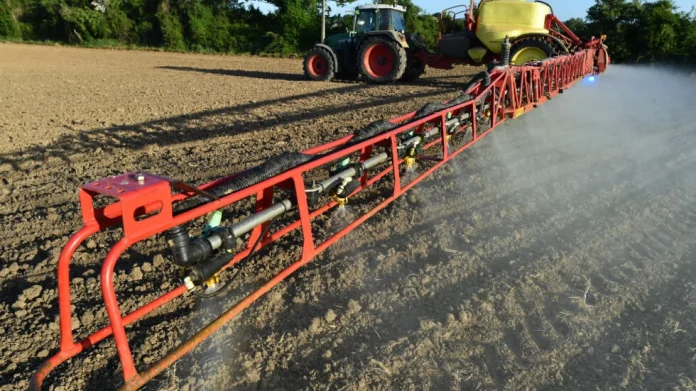France is set to abstain in the EU vote despite a pledge to ban the herbicide, Politico reports.
In 2017, French President Emmanuel Macron promised that the country would ban the controversial herbicide glyphosate within three years, reassuring environmentalists and health advocates.
I have asked the government to take the necessary steps to ban the use of glyphosate in France as soon as alternatives are found, and within three years at the latest.
Then, pressured by the European Parliament and influential agricultural powers France, Germany and Italy, EU countries reluctantly prolonged the authorisation to use the pesticide amid concerns that it was both carcinogenic and threatened biodiversity. In December last year, the licence was extended for a further 12 months.
Now, France and Germany are expected to skip Thursday’s vote on whether to allow chemical companies to continue selling the product to EU farmers for another decade. Italy votes in favour.
However, Macron’s promised national ban has long since failed. Developed by the US chemical company Monsanto in the 1970s, glyphosate became the dominant choice of farmers seeking to purge their fields of unwanted weeds.
Today, traces of glyphosate can be found in food, soil, water and air, even in rainfall. Potentially dangerous concentrations of glyphosate have also been found in the house dust of farmers and people living near cultivated land.
Experts link the use of pesticides in agriculture to increased incidence of cancer and illnesses such as Parkinson’s disease, as well as environmental degradation, including a decline in the number of insect pollinators needed to grow crops.
In 2022, the European Chemicals Agency concluded that glyphosate can cause serious eye injuries and is toxic to aquatic organisms, but it found no evidence that the chemical could cause cancer.
The European Food Safety Authority (EFSA) then ruled that glyphosate was safe for use in agriculture if used as directed. This decision, in turn, prompted the European Commission to recommend that EU countries vote to approve glyphosate for another 10 years.
The first round of voting in the secretive food safety committee, known as PAFF, stalled in October after not enough countries voted in favour.
Bayer, the German agrochemical company that bought Monsanto in 2018 and remains the largest producer of glyphosate, welcomed regulatory rulings confirming its safety.
“The assessment of the impact of glyphosate on the health of humans, animals and the environment did not identify critical areas of concern. Glyphosate is not carcinogenic, not genotoxic, mutagenic or toxic for reproduction. Overall, glyphosate meets the approval criteria as laid down in the EU regulation.”
Critics, including health and environmental groups, argue that the EU is prioritising the economic interests of the agricultural sector while failing to address the specific interactions of pesticides with the environment and the human body. Critics also point out that EFSA overwhelmingly relies on studies conducted by the industry itself, which the Commission accuses of failing to provide studies questioning the safety of their products.
EFSA acknowledges that the regulatory framework under which it operates is flawed, and the agency has long warned that it lacks the resources to modernise and expedite pesticide risk assessments.
The glyphosate debate has highlighted the fact that the way the regulatory framework currently assesses biodiversity issues is incomplete. We need to develop more comprehensive and systematic methodologies.
The agency’s point person for pesticide risk assessments, Guilhem de Seze, stated that the agency needed 50 more staff and another 15 million euros a year to address gaps and delays in pesticide assessments. Bernhard Url, de Seze’s chief executive, argued at a European Parliament hearing in July that the chemical had undergone “the most comprehensive and transparent assessment” of any pesticide.
“[This] is not to insinuate that glyphosate is green and fine and nothing has been found. Because we said there are data gaps. Some things could not be finalised. But there are mitigation measures for that. We report that very clearly — nothing is hidden.”
FNSEA, the country’s largest farming lobby, has expressed concerns about the practicality of banning glyphosate, citing the potential economic impact and lack of viable alternatives for weed control.
Macron’s initial three-year pledge gave way to vague promises and extended deadlines. Critics argued that the president decided to prioritise short-term political stability over the country’s long-term environmental health. In 2020, France decided to partially restrict the use of glyphosate where alternatives existed.
Luxembourg is currently the only EU country to have banned glyphosate at the national level. However, the ban was lifted earlier this year following a lawsuit by Bayer.
Thursday’s vote to extend the glyphosate ban hinges on the decisions of Germany and France, each of which could influence the outcome by voting against. The Commission is expected to approve its own recommendation to reauthorise glyphosate for another 10 years unless there is a qualified majority in favour or against.
German Agriculture Minister Cem Özdemir of the Green Party pledged to vote against the proposed extension but was forced to abstain because of divisions within the three-party centre-left coalition in Berlin.
His French counterpart, Marc Fesneau, favoured a shorter extension period of seven years, modelled on the country’s approach to phasing out glyphosate where alternatives are available. However, the Commission considered this proposal impractical.
While glyphosate remains a major source of revenue for Bayer, the company’s 2018 takeover of Monsanto has been called one of the worst corporate deals in history. Bayer has spent more than $11 billion to settle class action lawsuits in the US related to the alleged carcinogenicity of glyphosate, with some 40,000 cases pending.
